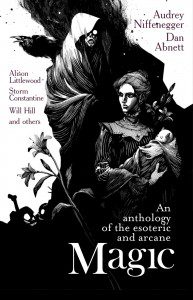 Publisher: Solaris
Publisher: Solaris
Paperback (384pp)
Magic is Jonathan Oliver’s third anthology, following hot on the heels of The End Of The Line and House Of Fear, also from Solaris. Oliver’s first two anthologies established him as a new editor to watch, and Magic goes on to cement his reputation, assembling a roll-call of both well-established (Audrey Niffenegger, Christopher Fowler, Storm Constantine) and up and coming names (Thana Niveau, Lou Morgan, Will Hill,) while taking in a wide range of stories, from horror through urban fantasy through to more traditional fantasy.
There are no poor stories here, although two or three tales end a bit too suddenly – Lou Morgan’s otherwise fine ‘Bottom Line’ seems to have barely finished establishing its world and protagonist before it’s done.
Sarah Lotz’s ‘If I Die, Kill My Cat’ is another that appears to finish prematurely , but that may be because it leaves you wanting to spend more time in its company. Rachel and Lindiwe, a two-woman crime scene clean-up crew, find the titular instruction in a dead man’s apartment, along with ample evidence of the dead man’s occult leanings, and, of course, a cat, which Rachel takes home with her. Bad move. With its well-evoked South African setting, dark humour, ripe characterisation and deft writing, this story was a personal favourite; if Lotz returns to the characters of Rachel and Lindiwe (not to mention Rachel’s white sangoma sister Naomi) in future stories, or perhaps a novel, it certainly won’t be any cause for regret here.
Steve Rasnic Tem and Melanie Tem are two fine writers of the weird and the supernatural; working in collaboration, they have created ‘Domestic Magic’. “Real magic,” thinks Felix, its teenage protagonist, “was a sham – hard to access, hard to control, crazy and arbitrary and unfair. It promised everything but never gave you what you really needed.” Felix’s mother claims to be a witch, but her ritualistic behaviour, dirty clothes and conversations with inanimate objects lead others to dismiss her as mad. She may be both; the end result is the same in either case. Poignant and at times distressing to read, this one is another of the anthology’s stand-outs.
Thana Niveau’s ‘First And Last And Always’ – you can’t beat a Sisters of Mercy based title – veers more into straightforward horror territory, but is none the worse for that. Niveau evokes the plight of love struck Tamsin, who improvises her own rough magic to snare the heart of her true love, with unforeseen and tragic consequences. Short and simple, yet intense, this is one that will stay with you.
The theme of being careful what you wish for resurfaces in Alison Littlewood’s ‘The Art Of Escapology’. Little Tommy pesters his father into taking him to the circus, only to see the magic of the big top as fake and tawdry; he craves the real thing. When his prayers are answered, the consequences are subtler and less brutal than in Niveau’s tale, but no less heartbreaking, and will linger as long in the reader’s imagination.
Christopher Fowler’s ‘The Baby’ is the anthology’s most uncompromising story. Naïve teen, Sasha, gets to meet her rock-star idol, Riley, only to have her illusions dashed in the most brutal way, and to be left pregnant. Appalled by the mechanics of termination, Sasha is offered an alternative by Martitia, who offers Sasha a magical means of ending the pregnancy, but things don’t go as planned. Fowler evokes Sasha’s conflicted feelings in the aftermath of both the rape and the pregnancy that ring horribly true.
And to round it off we have Robert Shearman’s ‘Dumb Lucy’. Shearman’s stories are always among the very best things in the issues they grace, and ‘Dumb Lucy’ is no exception. The title character is a mute little girl, who accompanies conjuror, The Great Zinkiewicz, through a world devastated by warring demons and angels, trying to stay ahead of the encroaching darkness. More than that would be to spoil the reader’s enjoyment – the magic of this story is in its telling, as is so often the case with Shearman’s work – but rest assured it’s a beautiful and moving conclusion to this anthology.
Of the remaining stories, Liz Williams provides a welcome touch of high fantasy with her tale ‘Cad Coddeu’, while Will Hill’s ‘Shuffle’ and Gemma Files’ ‘Nanny Grey’ provide potent horror fare. Black humour pervades Dan Abnett’s political satire ‘Party Tricks’ and Sophia McDougall’s internet-inspired ‘MailerDaemon’. Urban fantasy is ably represented in Storm Constantine’s ‘Do What Thou Wilt’ and Gail Z. Martin’s ‘Buttons’, and Niffenegger’s ‘The Wrong Fairy’ weaves together historical fiction and the fantastical in its account of the last years of Charles Altamont Doyle, alcoholic father of Sherlock Holmes’ creator.
There are no weak ’uns here, no sense of any second-rate bottom-drawer pieces accepted to get a well-known name on the cover; Oliver has held out for quality in order to put together an excellent anthology, and that’s what you’ll get for your money.
SIMON BESTWICK
If you enjoyed our review and want to read Magic: An Anthology of the Esoteric and Arcane, edited by Jonathan Oliver please consider clicking through to our Amazon Affiliate links. If you do you’ll help keep the This Is Horror ship afloat with some very welcome remuneration.
Buy Magic, edited by Jonathan Oliver (UK)
Buy Magic, edited by Jonathan Oliver (US)









